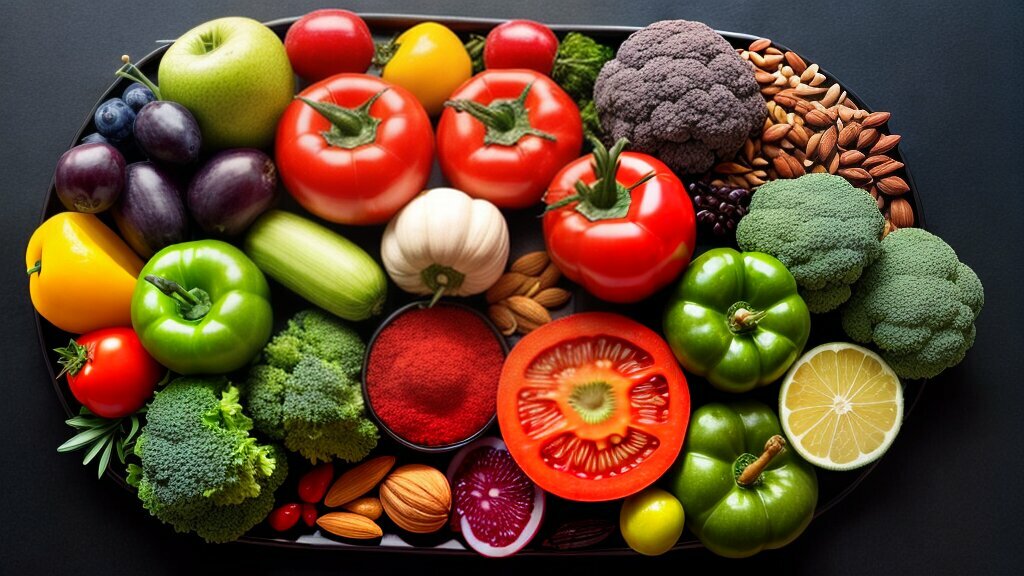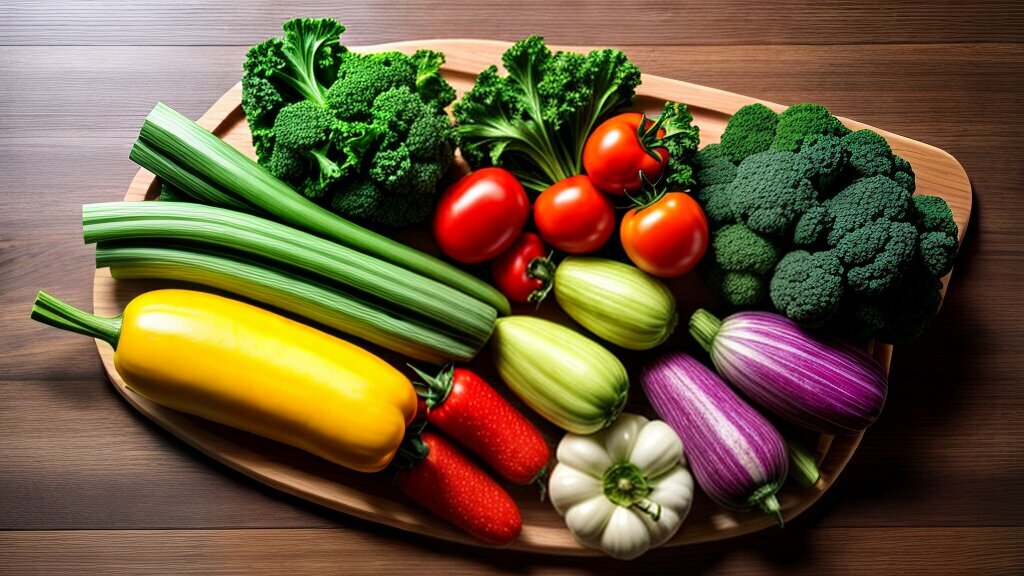Are you looking for ways to improve your overall health and well-being? Consider adopting a plant-based diet. By increasing your intake of fruits, vegetables, legumes, and whole grains, you’ll provide your body with the essential nutrients it needs to function at its best.
Plant-based diets have been linked to a lower risk of chronic diseases, such as heart disease, Type 2 diabetes, and certain cancers. They’re also better for the environment than traditional meat-based diets.
In this article, we’ll provide you with tips and advice for adopting a plant-based lifestyle, including nutrition tips, meal planning, and transitioning to a plant-based diet.
Key Takeaways:
- Adopting a plant-based diet can improve your overall health and wellbeing.
- Plant-based diets are linked to a lower risk of chronic diseases and are better for the environment.
- In this article, we’ll provide you with tips and advice for adopting a plant-based lifestyle.
The Power of a Plant-Based Diet: Vegan Nutrition Tips
Going plant-based doesn’t mean you have to compromise on nutrition. In fact, a well-planned vegan diet can provide all the nutrients your body needs to thrive!
One of the keys to a balanced plant-based diet is to include a variety of whole foods. This includes:
- Whole grains, such as brown rice, quinoa, and whole wheat bread
- Fruits and vegetables, with a focus on leafy greens, berries, and cruciferous vegetables like broccoli and cauliflower
- Legumes, such as lentils, chickpeas, and black beans
- Nuts and seeds, including almonds, walnuts, and chia seeds
It’s also important to pay attention to key nutrients that can be more challenging to get from a plant-based diet. These include:
| Nutrient | Sources |
|---|---|
| Protein | Legumes, tofu, tempeh, nuts and seeds, and whole grains |
| Iron | Dark leafy greens, legumes, fortified cereals, and tofu |
| Calcium | Kale, collard greens, broccoli, calcium-set tofu, and fortified plant milks |
| Vitamin B12 | Fortified plant milks, fortified cereals, and supplements |
If you’re struggling to meet your nutrient needs on a plant-based diet, consider working with a registered dietitian who can help you develop a personalized plan.
It’s also important to note that while supplements can be a helpful tool for meeting nutrient needs, they shouldn’t replace a healthy whole food diet. Focus on including a variety of nutrient-dense foods in your meals, and supplement as needed.
Tip: To make sure you’re getting enough omega-3 fatty acids, try incorporating flaxseeds, chia seeds, or walnuts into your diet!

Healthy Vegetarian Eating Tips: Plant-Based Meal Planning
Meal planning is essential for maintaining a healthy plant-based diet. With a little preparation, you can enjoy a variety of delicious and nutritious meals throughout the week. Here are some tips for planning and preparing plant-based meals:
Focus on Whole Foods
When planning your meals, focus on whole foods such as fruits, vegetables, whole grains, legumes, nuts, and seeds. These foods are rich in vitamins, minerals, and other important nutrients that your body needs to function properly.
Aim to have at least half of your plate filled with vegetables, a quarter with whole grains, and a quarter with plant-based protein sources such as legumes or tofu.
Batch Cook
Batch cooking is a great way to save time and ensure that you always have healthy meals on hand. At the beginning of the week, cook a large batch of beans, grains, or roasted vegetables, and use them in different meals throughout the week.
You can also batch prepare salads or smoothies by chopping up ingredients and storing them in containers in the refrigerator.
Get Creative with Flavors
Plant-based meals can be just as flavorful and satisfying as meat-based meals. Experiment with different herbs and spices, sauces, and marinades to add variety to your meals.
Try new recipes and cuisines to keep things interesting, such as Indian curries, Mexican tacos, or Mediterranean bowls.
Plan for Snacks
Having healthy snacks on hand can help you avoid reaching for processed and unhealthy options. Plan for snacks by prepping cut-up fruits and vegetables, hummus and crackers, or energy balls.
Consult with a Dietitian
If you are new to a plant-based diet or have specific dietary needs, consider consulting with a dietitian. They can help you ensure that your diet is nutritionally balanced and provide personalized recommendations.

Transitioning to a Plant-Based Lifestyle: Tips for Success
Transitioning to a plant-based lifestyle can be both exciting and daunting, but with the right mindset and approach, it can be a smooth and successful journey. Here are some tips to help you make the transition:
- Start small: Gradually introduce plant-based foods into your diet, and don’t feel like you need to go 100% vegan overnight. Begin with one meatless meal a day or week, and build from there.
- Experiment with new recipes: Explore a variety of plant-based recipes to keep your meals interesting and satisfying. There are countless delicious plant-based dishes out there to try, so don’t be afraid to get creative in the kitchen.
- Get informed: Education is key to success. Read up on the benefits of a plant-based lifestyle, learn about the different plant-based protein sources, and seek out guidance from experts or community groups.
- Find support: Surround yourself with like-minded individuals who can provide inspiration and encouragement on your journey. Join a local plant-based cooking or eating group, or connect with others online.
It’s important to remember that everyone’s journey to a plant-based lifestyle is unique, and there is no one-size-fits-all approach. Listen to your body, be patient with yourself, and celebrate small victories along the way.

“Going plant-based can be one of the most significant positive steps you can take for your health and the planet’s health.” – Dr. Michael Greger
Conclusion
In conclusion, adopting a plant-based diet can have numerous health benefits for those living in Australia. By prioritizing nutrient-rich plant-based foods, you can improve your overall health and reduce your risk of chronic diseases.
Remember to focus on obtaining essential nutrients, such as protein, iron, and vitamin B12, through a variety of plant-based sources and supplementation if necessary. Additionally, creating a meal plan and incorporating a range of whole grains, fruits, vegetables, legumes, and nuts can make transitioning to a plant-based lifestyle easier.
While it may take time to adjust to a plant-based lifestyle, don’t be discouraged by occasional setbacks. Seek support from like-minded individuals and prioritize self-care to ensure your success in achieving a healthy and compassionate way of eating.
By making the switch to plant-based eating, you are not only prioritizing your health but also contributing to a more sustainable and eco-friendly food system. Remember to consult with healthcare professionals for personalized advice and embrace plant-based eating as a fulfilling and vibrant choice for your health and wellbeing.
FAQ
Q: What are the benefits of a plant-based diet?
A: Adopting a plant-based diet can bring numerous benefits to your health. It has been associated with reduced risk of chronic diseases such as heart disease, diabetes, and certain types of cancer. Plant-based diets are typically higher in fiber, vitamins, minerals, and antioxidants, which can improve digestion, boost immune function, and support overall well-being.
Q: How can I ensure proper nutrition on a plant-based diet?
A: To ensure proper nutrition on a plant-based diet, it is important to focus on a variety of plant foods. This includes incorporating sources of protein such as legumes, tofu, tempeh, and seitan. It is also essential to consume a wide range of fruits, vegetables, whole grains, nuts, and seeds to obtain the necessary vitamins, minerals, and phytonutrients. Additionally, considering appropriate supplementation and consulting a healthcare professional can help address any nutrient gaps.
Q: How can I plan meals on a plant-based diet?
A: Planning meals on a plant-based diet can be made easier by incorporating a variety of plant-based foods into your menu. Including whole grains, such as quinoa and brown rice, along with a range of colorful fruits and vegetables can provide a diverse array of nutrients. Utilizing batch cooking and meal prepping strategies can save time and ensure you have nutritious options readily available. Furthermore, seeking recipe inspiration and experimenting with new plant-based ingredients can make meal planning exciting and enjoyable.
Q: What are some tips for transitioning to a plant-based lifestyle?
A: Transitioning to a plant-based lifestyle can be a gradual process. Start by incorporating more plant-based meals into your weekly routine and gradually reducing animal products. Experiment with different plant-based recipes and flavors to make the transition enjoyable. It can also be helpful to seek support from online communities, friends, or family members who share your interest in plant-based eating. Remember to prioritize self-care and be patient with yourself as you navigate your new dietary choices.
